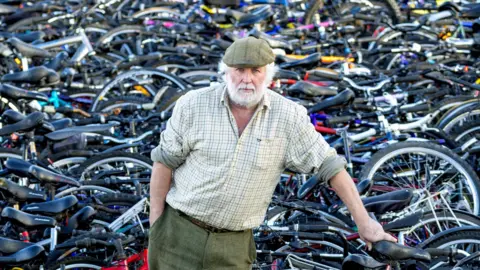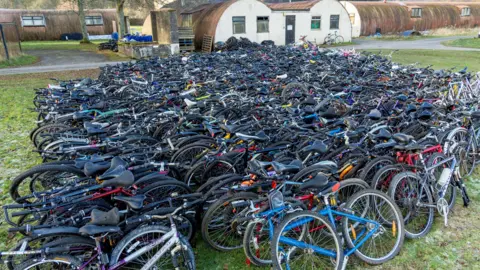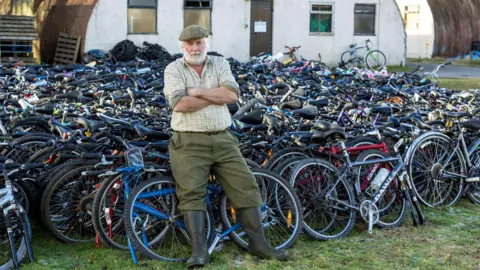Man has 500 bikes for Sudan refused at port
 Graeme Hart/PPA
Graeme Hart/PPAA man who tried to send 500 bikes to a charity in Sudan had them refused at a Scottish port after they were classed as waste.
Nigel Carter, 64, had been gathering bicycles across Scotland to be shipped to Sudan, to help people who need access to cheap transport.
The Scottish Environment Protection Agency (SEPA) said the shipment could not leave the country as an inspector had deemed them unfit for purpose because some of them needed repairs.
The bikes were shipped back to Mr Carter in Comrie, Perthshire, which he said meant they risked being scrapped.
 Graeme Hart/PPA
Graeme Hart/PPAMr Carter told BBC Scotland's Drivetime on Thursday that he had gathered the bikes from Scottish recycling centres to offer to Scottish charities - and those not taken were given to a charity in Sudan.
The current civil war in the north east African country means there is a lack of resources such as oil and fuel, so bikes have become more sought after.
The bikes were shipped in a container to a Scottish port, where it was stopped for an inspection by environment officials.
Gary Walker, a waste manager at Sepa, said some of the bikes needed repairs before they could be reused.
The container was sent back to Mr Carter.
He told the BBC he thought it was "ludicrous" that his container had not met the shipping requirements.
Mr Carter said he did not think there was a set standard that the bicycles were marked against and the inspector's decision was arbitrary.
"It's as whimsical as if someone were to have a bad day, they could refuse the container," he said.
 Graeme Hart / PPA
Graeme Hart / PPAMr Walker from Sepa said the repairs necessary to the bikes meant they were considered waste.
He said he had a duty to ensure that Scotland’s waste was not simply dumped in another country.
In a statement, Sepa told BBC Scotland they had contacted Mr Carter about the bicycle repairs before shipment and they were disappointed in their condition by the time they were shipped.
They said they were not confident that the bikes would be reused as bikes.
Mr Carter said he suspected some of the bikes would need work when they arrived in Africa but did not understand what else they would have been used for.
A cycle of waste
According to Mr Carter the repairs raised by Sepa were only minor and easily fixed, including oil on chains, rusted frames and broken brake cables.
He said that these repairs would be more cost effective if carried out in Sudan rather than in Scotland.
The Sudanese charity receiving the bikes had picked them out and were happy with their condition, Mr Carter said.
He added that the bikes were also approved by qualified bicycle mechanics.
The bikes would have been used across Sudan for children to get to school or to help people run their businesses.
He told the BBC it was costing the Sudanese charity for the shipping container to be sitting in "limbo" and puts them at risk of closing.
Mr Carter said the bikes will now most likely be scrapped or taken back to the recycling centre, where they were picked from.
